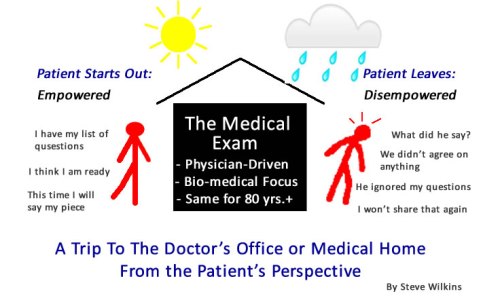December 27th, 2011 by BarbaraFicarraRN in Health Policy, Opinion
1 Comment »


Bill Crounse, MD, Senior Director, Worldwide Health, Worldwide Public Sector Microsoft Corporation shares his insights and describes four leading trends and technologies that will transform health and health care in 2012 and beyond.
These leading technologies include: cloud computing, health gaming, telehealth services and remote monitoring/mobile health.
Telehealth, Remote Monitoring, Mobile Health
I’d like to focus on telehealth and remote monitoring/mobile health since I feel telehealth is the nucleus of patient care, and telehealth can help reduce health care costs, and improve quality health care for patients. Telehealth technology combined mobile technology such as smartphones will make monitoring patients conditions easier and more efficient, and “cheaper and more scalable.”
Patient Quality Health Care
Through the Accountable Care Organizational Model (ACO), the core concept is to Read more »
*This blog post was originally published at Health in 30*
December 10th, 2011 by BarbaraFicarraRN in Health Policy, Opinion
No Comments »


How do companies curb health care costs?
Do healthier employees lead to increased productivity? Several progressive companies believe so and have committed to providing employees with programs to help engage them in a healthier lifestyle.
As part of the incentives to lead a healthier lifestyle some employers have instituted a penalty and reward system tied to the companies’ benefits. For example, smokers may incur a significant surcharge to the cost of their health insurance plan while nonsmokers could see a reduction in cost.
According to an article in The New York Times, a growing numbers of companies including Home Depot, PepsiCo, Safeway, Lowe’s and General Mills are seeking higher premiums from some workers who smoke, similar to Wal-Mart’s addition of a $2,000-a-year surcharge for some smokers.
Escalating health care costs Read more »
*This blog post was originally published at Health in 30*
November 30th, 2011 by StevenWilkinsMPH in Opinion
1 Comment »

I may not know how to tell the difference between an empowered patient, an engaged patient, or an activated patient. But I do know that the fastest way to disempower, disengage, and de-activate any patient is a trip to the doctor’s office or the hospital. A visit to an average primary care physician (or specialist) is to an empowered/activated/engaged patient what Kryptonite is to Superman. It will stop all but the strongest willed patients dead in their tracks.
 We patients have been socialized that way. Think about your earliest memories of “going to the doctor.” For me, I remember my Mom taking me to the Pediatrician. Early on I learned by watching the interaction between my Mom and the doctor that they each had a role. The doctor’s role was that of expert – he spoke and my Mom listened. I was there just to have one or more extremities twisted and prodded. And oh the medicinal smell…
We patients have been socialized that way. Think about your earliest memories of “going to the doctor.” For me, I remember my Mom taking me to the Pediatrician. Early on I learned by watching the interaction between my Mom and the doctor that they each had a role. The doctor’s role was that of expert – he spoke and my Mom listened. I was there just to have one or more extremities twisted and prodded. And oh the medicinal smell…
Things haven’t changed much in the 40 years since I was a kid sitting in Dr. Adam’s office. Read more »
*This blog post was originally published at Mind The Gap*
November 10th, 2011 by PreparedPatient in Expert Interviews
No Comments »

This interview is the ninth and final of a series of brief chats between CFAH president and founder, Jessie Gruman, and experts—our CFAH William Ziff Fellows—who have devoted their careers to understanding and encouraging people’s engagement in their health and health care.
 Trudy Lieberman is concerned that despite all the rhetoric, choosing the best hospital, the best doctor, the best health plan, is simply not possible. Some of the so-called best might be good for some people but not others, and the information available to inform/guide choices is just too ambiguous.
Trudy Lieberman is concerned that despite all the rhetoric, choosing the best hospital, the best doctor, the best health plan, is simply not possible. Some of the so-called best might be good for some people but not others, and the information available to inform/guide choices is just too ambiguous.
Ms. Lieberman is a CFAH William Ziff Fellow.

Gruman: What has changed in the past year that has influenced people’s engagement in their health and health care?
Lieberman: Costs have risen a lot, and employers and insurers have made consumers pay higher deductibles, co-pays and coinsurance. The theory is, Read more »
*This blog post was originally published at Prepared Patient Forum: What It Takes Blog*
November 4th, 2011 by BarbaraFicarraRN in News, Opinion
No Comments »

 Social media has changed the landscape in health care. Social media is a powerful and phenomenal platform to help educate consumers, raise awareness of health issues and connect with consumers and colleagues.
Social media has changed the landscape in health care. Social media is a powerful and phenomenal platform to help educate consumers, raise awareness of health issues and connect with consumers and colleagues.
Social media gives a voice to patients and consumers and it allows the conversation to get started with doctors and other health care professionals. Social media is all about the patient and it paves the way for new modern medicine to emerge.
Tapping into technology allows for the real-time and immediate exchange of information.
Consumers and physicians tapping into social media networking
According to a study published by Pew Internet and American Life Project, 65% of adult internet users use social networking sites and 80% of internet users gather health information online.
In a recent study by QuantiaMD and Care Continuum Alliance, over 65% of physicians Read more »
*This blog post was originally published at Health in 30*








 Trudy Lieberman
Trudy Lieberman Social media has changed the landscape in health care. Social media is a powerful and phenomenal platform to help educate consumers, raise awareness of health issues and connect with consumers and colleagues.
Social media has changed the landscape in health care. Social media is a powerful and phenomenal platform to help educate consumers, raise awareness of health issues and connect with consumers and colleagues.







